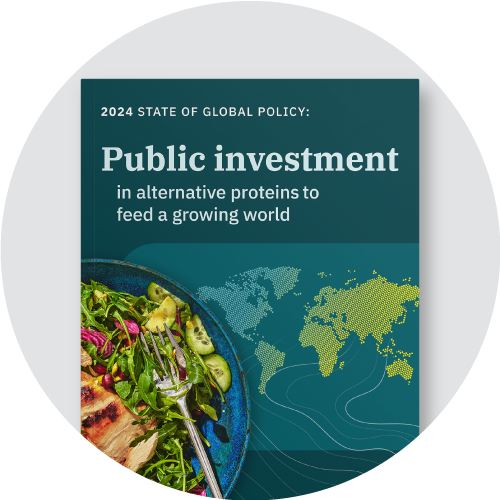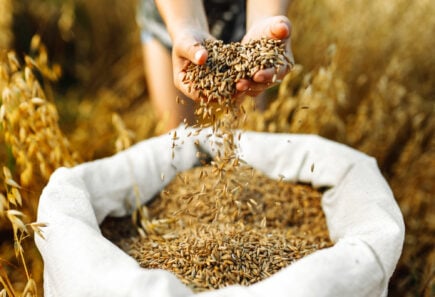
The State of Global Policy: Alternative proteins
As policymakers recognize the power of alternative proteins to boost their economies, protect their environments, and ensure their food security, governments have adopted a range of policies affecting the field. This report tracks the investment, support, and regulation enacted across the globe.

Read the full report
Key findings
- Taken as a whole, public investment in alternative proteins remained steady in 2024, largely matching the level set in 2023.
- We estimated that governments around the world announced about $510 million in new committed support for alternative proteins, including increases in R&D. This brings the all-time cumulative commitment from governments to around $2.1 billion.
- New announced initiatives for alternative protein and food technology added to the important work of existing projects, programs, and opportunities. Estimating the amount of annual support through these and previous programs yields about $560 million in disbursements in 2024, exceeding the $348 million estimated to have been invested in 2023.
- To reap the full benefits of a mature alternative protein sector, including up to 9.8 million jobs, $1 trillion in economic value, and benefits for food resilience, global health, and environmental security, a Global Innovation Needs Assessment (GINA) found that governments must invest $10.1 billion in alternative proteins on an annual basis. Though new announcements boosted prospects for future investment, the estimated $560 million spent in 2024 satisfies less than six percent of this need.
- For the first time, public investments in fermentation technologies ($203 million), which include precision fermentation, biomass fermentation, and gas fermentation, have exceeded public investment in plant-based protein.
- In 2024, plant-based proteins received less new public investment ($146 million) than in prior years.
- Cultivated meat received $84 million in public investment in 2024, doubling from the previous high of $42 million in 2023.
- Other government actions not incorporated in our estimate include stand-out announcements made by China and India to develop food biomanufacturing through government-supported research hubs and national bioeconomy plans. While these broad biotechnology plans encompass technologies and priorities beyond the scope of alternative proteins, they include these new food technologies prominently.
- The fair regulation of alternative proteins experienced uneven progress across the globe.
- Headwinds for alternative proteins’ fair access to markets continued in 2024. Several countries and U.S. states took action to ban or restrict alternative proteins, with various degrees of success.
- However, as in 2023, there were more successes than setbacks. Cultivated meat was approved for the first time in Israel and sold for the first time in Hong Kong; new fermentation-derived foods were approved for the first time in Canada; new regulatory processes were set up or tested for the first time in Australia/New Zealand, China, the EU, and South Korea; and applications for cultivated meat approvals were submitted for the first time in the European Union, South Korea, and Thailand.
- The years 2023 and 2024 were marked by geopolitical upheaval, food supply chain stresses, new technologies like artificial intelligence, concerns about international trade, threatening zoonotic diseases, and many other issues of global concern.
- Alternative proteins can help address these challenges by providing domestic food sources from new and existing resources, creating jobs benefiting local economies, and enhancing resilience to disease and other disruptors.
- While 2025 presents new and unpredictable developments, alternative proteins continue to offer policymakers viable opportunities to navigate global challenges, build scientific and economic strength, and provide citizens and global markets with new sources of food.

Public investment database
Browse our database of public investments in alternative proteins to learn more about how governments are supporting their economies, scientific ecosystems, and food security through alternative proteins.

Download our at-a-glance summary
Don’t have time to read the full report? Check out our summary for a quick view of the highlights and key data points from this report.
Hear from our experts
This webinar covers the current landscape of public investment in alternative proteins, providing a global analysis of government action and investment in plant-based, cultivated, and fermentation-derived foods. Join our experts from around the world to learn more about global public investments in alternative protein R&D, product commercialization, capacity building, and more; regulatory updates from 2024 and the state of global regulation; trends in alternative protein investment by region, sector, and strategy; and deep dives on major governments from local GFI affiliates.

Sign up for our policy newsletter
Protein Innovation Nation is a monthly newsletter covering local and national updates in the United States around public research and commercialization support, regulation, legislation, and labeling.
Support our work
Our alternative protein research, insights, and advocacy are made possible thanks to our generous, global family of donors. Philanthropic support is vital to our mission. Connect with us today to discuss how you can help fuel this transformative work.




